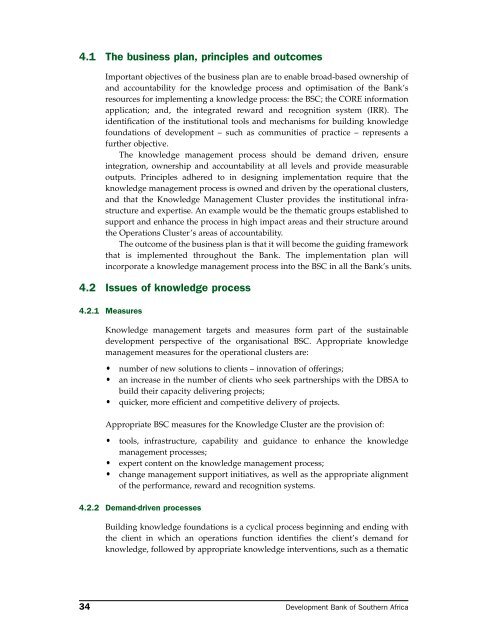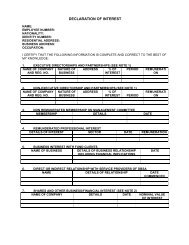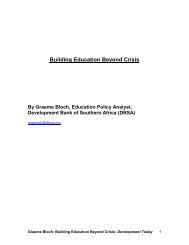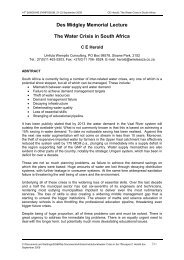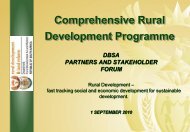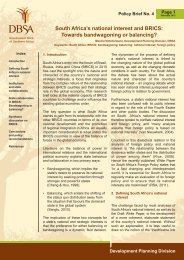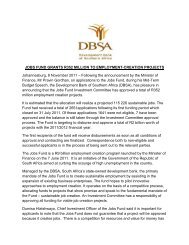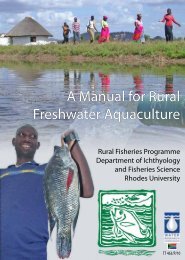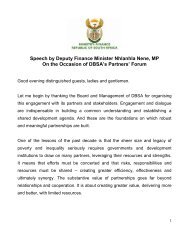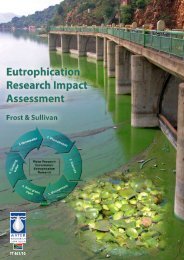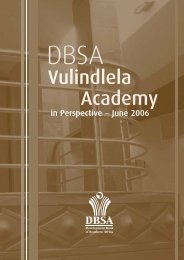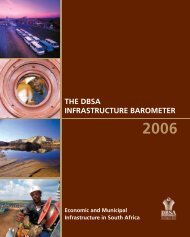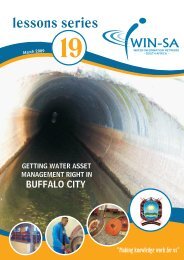A Knowledge Strategy
A Knowledge Strategy
A Knowledge Strategy
Create successful ePaper yourself
Turn your PDF publications into a flip-book with our unique Google optimized e-Paper software.
4.1 The business plan, principles and outcomes<br />
Important objectives of the business plan are to enable broad-based ownership of<br />
and accountability for the knowledge process and optimisation of the Bank’s<br />
resources for implementing a knowledge process: the BSC; the CORE information<br />
application; and, the integrated reward and recognition system (IRR). The<br />
identification of the institutional tools and mechanisms for building knowledge<br />
foundations of development – such as communities of practice – represents a<br />
further objective.<br />
The knowledge management process should be demand driven, ensure<br />
integration, ownership and accountability at all levels and provide measurable<br />
outputs. Principles adhered to in designing implementation require that the<br />
knowledge management process is owned and driven by the operational clusters,<br />
and that the <strong>Knowledge</strong> Management Cluster provides the institutional infrastructure<br />
and expertise. An example would be the thematic groups established to<br />
support and enhance the process in high impact areas and their structure around<br />
the Operations Cluster’s areas of accountability.<br />
The outcome of the business plan is that it will become the guiding framework<br />
that is implemented throughout the Bank. The implementation plan will<br />
incorporate a knowledge management process into the BSC in all the Bank’s units.<br />
4.2 Issues of knowledge process<br />
4.2.1 Measures<br />
<strong>Knowledge</strong> management targets and measures form part of the sustainable<br />
development perspective of the organisational BSC. Appropriate knowledge<br />
management measures for the operational clusters are:<br />
• number of new solutions to clients – innovation of offerings;<br />
• an increase in the number of clients who seek partnerships with the DBSA to<br />
build their capacity delivering projects;<br />
• quicker, more efficient and competitive delivery of projects.<br />
Appropriate BSC measures for the <strong>Knowledge</strong> Cluster are the provision of:<br />
• tools, infrastructure, capability and guidance to enhance the knowledge<br />
management processes;<br />
• expert content on the knowledge management process;<br />
• change management support initiatives, as well as the appropriate alignment<br />
of the performance, reward and recognition systems.<br />
4.2.2 Demand-driven processes<br />
Building knowledge foundations is a cyclical process beginning and ending with<br />
the client in which an operations function identifies the client’s demand for<br />
knowledge, followed by appropriate knowledge interventions, such as a thematic<br />
34 Development Bank of Southern Africa


